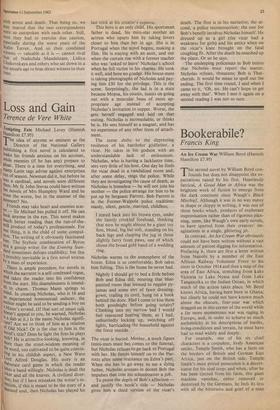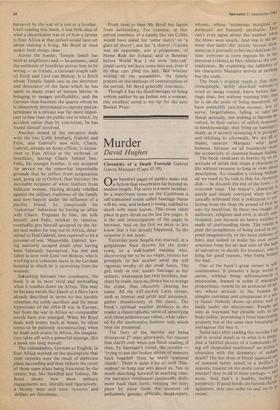Bookerabile?
Francis King
An Ice Cream War William Boyd (Hamish Hamilton £7.95) rrhis second novel by William Boyd con- 1 founds but does not disappoint the ex- pectations raised by his first. Heartlessly farcical, A Good Man in Africa was the brightest work of fiction to emerge from the dark continent since Waugh's Black Mischief. Although it was in no way messy in shape or sloppy in writing, it was one of those books which, products of exuberant improvisation rather than of rigorous plan- ning, seem, like Waugh's own early novels, to have spurted from their creators' im- aginations in a single, glittering jet.
In contrast, An Ice Cream War obviously could not have been written without a vast amount of patient digging for information. Prefacing it, there are first a letter written from Nairobi by a member of the East African Railway Volunteer Force to his sister in October 1914 and then a map of the area of East Africa, stretching from Lake Victoria to Lake Nyasa and from Lake Tanganyika to the Indian Ocean, in which much of the action takes place. Mr Boyd knows Africa, having been born in Ghana; but clearly he could not have known much about the obscure, four-year war which dragged on in this corner of the world while a far more momentous war was raging in Europe, and, in order to achieve so much authenticity in his descriptions of battles, living-conditions and terrain, he must have had to read widely and deeply.
For example, one of his six chief characters is a corpulent, lively American settler, Temple Smith, who has a farm on the borders of British and German East Africa, just on the British side. Temple Smith's most prized possession is a decort- icator for his sisal crop; and when, after he has been ejected from his farm, this giant machine vanishes, either removed or destroyed by the Germans, he feels its loss with all the bitterness and grief of a man bereaved by the war of a son or a brother. Until reading this book, I had little idea of what a decorticator was or of how a farmer in East Africa at that period would have set about making a living. Mr Boyd at once makes both things clear.
Across the border, Temple Smith has both as neighbours and — he assumes, until the outbreak of hostilities proves him to be wrong — as friends, a German couple call- ed Erich and Liesl von. Bishop. It is Erich whom Temple Smith sees as the destroyer and desecrator of the farm which he has spent so many years of intense labour in bringing to meagre profitability; and the German then becomes the quarry whom he is obsessively determined to capture and ex- terminate in a private war far more impor- tant to him than the public one in which, by accident rather than by conviction, he has found himself involved.
Another strand of the narrative deals with the two Cobb brothers, Gabriel and Felix, and Gabriel's new wife, Charis. Gabriel, already an Army officer, is despat- ched to East Africa at the outbreak of hostilities, leaving Charis behind him Felix, his younger brother, is not accepted for service on the somewhat improbable grounds that he suffers from astigmatism and, going up to Oxford, then becomes the inevitable recipient of white feathers from bellicose women. Having already rebelled against the military traditions of the family and now heavily under the influence of a pacifist friend, he compounds his `traitorous' behaviour by having an affair with Charis. Pregnant by him, she kills herself; and Felix, stricken by remorse, eventually gets himself accepted by the Ar- my and makes his way out to Africa, deter- mined to find Gabriel, now reported to be a prisoner-of-war. Meanwhile, Gabriel, hav- ing narrowly escaped death after having been hideously bayonetted, has met and fallen in love with Liesl von Bishop, who is working as a volunteer nurse in the German hospital in which he is recovering from his wounds.
Setsawing between two continents, the book is at its most vivid and enthralling when it touches down on Africa. This may be because novels like Death of a Hero have already described in terms no less harshly relentless the noble sacrifices and the mean hypocrisies of the 1914-18 war in Europe, but from the war in Africa no comparable novels have ever emerged. When Mr Boyd deals with events back at home, he often seems to be patiently reconstructing; when he deals with events in Africa, his imagina- tion takes off with a powerful upsurge, like a hawk too long mewed.
The commanders, German or English, in East Africa worked on the assumption that their victories were the result of elaborate plans succeeding and their failures the result of those same plans being frustrated by the enemy; but, like Stendhal and Tolstoy, Mr Boyd shows how most military engagements are, literally and figuratively, a bloody mess and most victories and defeats are fortuitous. From time to time Mr Boyd has lapses from authenticity. For example, at that period members of a family like the Cobbs would have asked for 'some sherry' or 'a glass of sherry', not for 'a sherry'; Carson was an opponent, not a proponent, of Home Rule for Ireland; and in Bombay before World War I the term 'taxi-cab' could surely not have come into use, even if by then cars plied for hire. But whether writing of the armaments, the family prayers or the methods of contraception of the period, Mr Boyd generally convinces.
Though it has the disadvantages of being written neither by an Indian nor a woman, this excellent novel is my tip for the next Booker Prize.



































 Previous page
Previous page